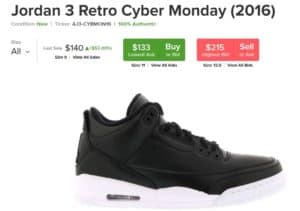StockX wants in on the primary and secondary market for limited edition goods, such as sneakers, watches, handbags and streetwear.
The Detroit-based marketplace launched in 2016 billing itself as “the stock market of things” where consumers can both buy and sell new and pre-owned products similar to how commodities are traded on the stock market. Now three years later, StockX just secured a $110 million Series C funding round, which values the marketplace at over $1 billion.

CEO Josh Luber
Co-founder and CEO Josh Luber detailed why StockX’s approach to selling these products is unique and fair to both consumers and brands at the Internet Retailer Conference and Exhibition at RetailX in June.
The premise for StockX, Luber said, works off economic basics of supply and demand: If there is a limited product and high demand, the price increases. In the sneaker world, this often leads to a competitive secondary market, where a limited-edition sneaker with only 500 products available, may have retailed for $200 originally but is now worth more than $10,000 on the secondary market.
On StockX.com, consumers can see the value of the goods fluctuate as they change hands. On one product detail page, a consumer can see how many of a certain product is available by size, how the price fluctuates by size, how the price has fluctuated over time, what price a shopper could buy the product for and what price a shopper could sell the product for.
Plus, because this is online, most consumers have equal access to the goods, which eliminates the need for a consumer to camp outside a store waiting for a sneaker release.
 StockX also has “IPOs,” in which a product is released for the first time on StockX. For example, StockX and jeweler Ben Baller created 800 slide shoes that had a jewelry chain with rap lyrics on it earlier this year. These slides would likely retail for $70; however, because they were initially released on StockX, shoppers bid on how much they would pay for their size and color of the shoe. During this initial period, consumers could not see each other’s bids. Every size and color had 10 products, so consumers with the top 10 bids for each SKU got to purchase the product. However, the winning 10 customers only paid the price of the 10th highest bid or the “clearing price.” For example, if the top-bidding consumer bid $800 for the product, but the 10th highest bid was $200, all consumers No. 1-10 only paid the $200 clearing price. This ensures that the consumers who were willing to pay the most money for the product received it. Plus, the customers are happy since even though they paid more than the retail place, most paid less than what they were willing to pay, Luber said.
StockX also has “IPOs,” in which a product is released for the first time on StockX. For example, StockX and jeweler Ben Baller created 800 slide shoes that had a jewelry chain with rap lyrics on it earlier this year. These slides would likely retail for $70; however, because they were initially released on StockX, shoppers bid on how much they would pay for their size and color of the shoe. During this initial period, consumers could not see each other’s bids. Every size and color had 10 products, so consumers with the top 10 bids for each SKU got to purchase the product. However, the winning 10 customers only paid the price of the 10th highest bid or the “clearing price.” For example, if the top-bidding consumer bid $800 for the product, but the 10th highest bid was $200, all consumers No. 1-10 only paid the $200 clearing price. This ensures that the consumers who were willing to pay the most money for the product received it. Plus, the customers are happy since even though they paid more than the retail place, most paid less than what they were willing to pay, Luber said.
For this release, the average clearing price was $210, and 97% of the customers paid less for the product than what they bid, he said.
This is also fair for brands, Luber says, as they are then able to get more money if their product is in high demand. “For the brand you $210 instead of $70,” Luber said.
Then, after the auction is over, the secondary market resell immediately begins on StockX. The shoes resell price started at $350, he said. Hypothetically, some shoppers could have won the initial auction and immediately resold the shoes, and earned $140 without ever being in possession of the physical shoes, much like trading commodities is on the stock market. Luber also likens this to ticket seller Stubhub.com, which is both the primary market for some official events, and the secondary market.
For pre-owned goods, sellers ship their items directly to StockX for the marketplace to inspect and authenticate the goods.
StockX is No. 31 in in the ranking of Internet Retailer Online Marketplaces.
Sneaker marketplaces are a hot area in U.S. retail. In addition to StockX, Internet Retailer ranks four other marketplaces that sell new and pre-owned sneakers including GOAT, Flight Club, Stadium Goods and Kixify. Collectively, the five grew 30.9% to $1.15 billion in gross merchandise value in 2018, according to Internet Retailer. That’s faster than the 22% growth of the entire Top 100 marketplaces and the 14% growth of the overall U.S. ecommerce industry in 2018.
Excluding StockX’s most recent funding round, these five marketplaces have raised $164.7 million in investment funding, according to Internet Retailer.
Favorite